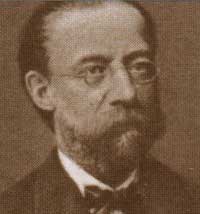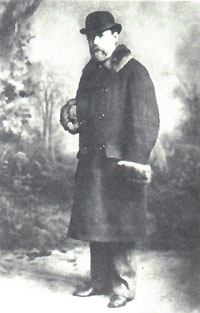Bedrich Smetana

|
Over the years, Smetana’s problem with money improved very little, and things actually got worse for him. Between 1854 and 1856 three of his four daughters died which left him very sad. When he was told by a friend that there was an opening for a piano teacher, he went for it. This job lasted from 1856 to 1861. This job was being a conductor in Sweden. While he was in Sweden his luck began to change, and he was wanted by many as a pianist, a teacher, and a conductor. He also turned to writing symphonic poems during this time. This was because of the influence of his friends Berlioz and Liszt. Inspired by Liszt’s example, he decided to compose his first symphonic poems. His wife’s health was not good so he was forced to take her back home to Bohemia in 1859. She died in Dresden not too long after. After two years of being alone he found his second wife, Bettina Ferdinandova. Smetana was upset when he return to Prague because he was not anymore successful than he had been before. It was not until his first opera, The Brandenburgers in Bohemiz, was performed in 1866 that people started to notice him. His second opera, The Bartered Bride, was put in production and liked by many people. This opera is the best known of all the operas written by Smetana. The overture makes a brilliant opening to many orchestra concert programs. 
As the main conductor of the Provisional Theatre from 1866-1874, Smetana added 43 operas to his list of achievements. Smetana fashioned most of his music after the melodic style of his home country. Two of Smetana’s most nationalistic operas are Dalibor, which had a heroic national theme, and Libuse, which was performed at the opening of the National Theater in Prague in 1881. Ma Vlast or My Country was written between 1874 and 1879. This is a symphonic poem in a cycle of six poems which included The Maldau, the one that is his most popular. The Maldau is one of the most successful pieces of descriptive music ever written. People who have heard it often think of the rushing waters of the Moldau river. Smetana attached a description to score of The Maldau the started out saying: "Two springs gush forth in the shade of the Bohemian forest, the one warm and sprouting, the other cold and tranquil. Their ripples, gaily flowing over rocky beds, unite and glisten in the morning sun. The forest brook, rushing on, becomes the River Vlatara (Moldau), which hurrying through Bohemia’s valleys, grows into a mighty stream. It flows through dense woods, where the joyous noise of the hunt and the tones of the hunter’s horns resound nearer and nearer." The river also flows past a wedding being held on the shore of the river. Two popular works from the six symphonic poems My Country and From the Fields and Groves of Bohemia, are often performed as two separate pieces or played as all the six pieces together. Vltava or River Moldau is the best known of Smetana’s orchestral works of Ma Vlast. Smetana wrote seven other operas, which included The Brandenburgers in Bohemia , Dalibor, Two Windows, The Kiss, and The Secret . Some of his symphonic poems in the style of Liszt, include Richard III, Hakon Jarl, and Libused. In addition to the operas that Smetana has written he composed the Piano Trio in G Minor, two string quartets in E minor and C minor, and many other piano compositions, songs, and choruses. In 1873, Antonin Dvorak realized that he could be a great composer because of Smetana’s inspiration. Dvorak began to capture the spirit of his land. Both Smetana and Dvorak were well trained in their traditional methods of music. The style of Smetana’s was that of Liszt’s, and the style of Dvorak’s was that of Brahm's. In 1874 Smetana discovered the first signs of the syphilis that was later the cause of his going deaf. The String Quartet performed From My Life suggests in the last movement that piercing whistling haunted Smetana’s every evening, making work for him almost impossible. He somehow, however, was able to complete two more operas, a second string quartet and several other works before his mental equilibrium was seriously damaged in 1883. In April 1884 he was taken to the Prague lunatic asylum where later that month he died. Smetana was the first major nationalist composer of Bohemia. Through his lifetime, he gave his people a new musical identity and self- confidence by his technique and originality in handling national subjects. In most of the operas and symphonic poems written by Smetana, he drew on his country’s legends, history, characters, scenery and ideas. He presented these ideas with a freshness and color which owe little to indigenous folksong but much to a highly original and essentially dramatic musical style. 
Listen : Vltava (Bedrich Smetana: Ma vlast) [MIDI] ( The flow of Vltava river ) Listen : Vysehrad (Berich Smetana: Má vlast) [MIDI] |
Other famous people & artists
Antonin Dvorak
Back